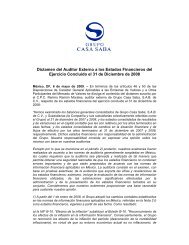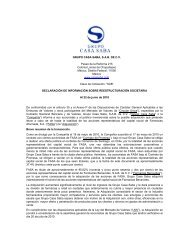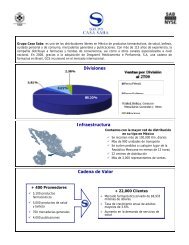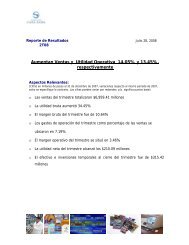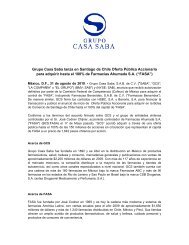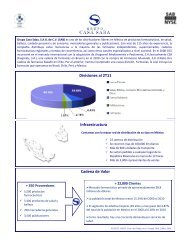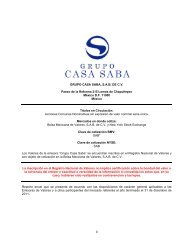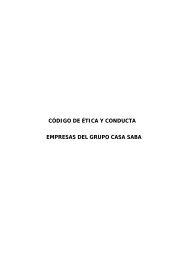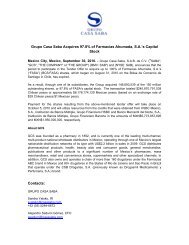FORM 20-F Grupo Casa Saba, S.A.B. de C.V.
FORM 20-F Grupo Casa Saba, S.A.B. de C.V.
FORM 20-F Grupo Casa Saba, S.A.B. de C.V.
Create successful ePaper yourself
Turn your PDF publications into a flip-book with our unique Google optimized e-Paper software.
Table of Contents<br />
Item 10.<br />
Additional Information<br />
Market Regulation and Registration Standards<br />
In 1946, the Comisión Nacional <strong>de</strong> Valores, or the National Securities Commission, commonly known as the CNV, was established to regulate stock market activity. In<br />
1995, the CNV and the Comisión Nacional Bancaria, or the National Banking Commission, were merged to form the CNBV. The Mexican Securities Market Law, which took effect in<br />
1975, introduced important structural changes to the Mexican financial system, including the organization of brokerage firms as corporations with variable capital, or socieda<strong>de</strong>s<br />
anónimas <strong>de</strong> capital variable. The Mexican Securities Market Law sets standards for authorizing companies to operate as brokerage firms, which authorization is granted at the<br />
discretion of the Ministry of Finance upon the recommendation of the CNBV. In addition to setting standards for brokerage firms, the Mexican Securities Market Law empowers the<br />
CNBV, among other things, to regulate the public offering and trading of securities and to impose sanctions for the illegal use of insi<strong>de</strong>r information. The CNBV regulates the Mexican<br />
securities market, the Mexican Stock Exchange and brokerage firms through a board of governors composed of thirteen members, five of which are appointed by the Ministry of<br />
Finance.<br />
In June <strong>20</strong>01, the Mexican Securities Market Law required issuers to increase the protections offered to minority stockhol<strong>de</strong>rs and to impose corporate governance<br />
controls on Mexican-listed companies in line with international standards. The Mexican Securities Market Law then in effect expressly permitted Mexican-listed companies, with prior<br />
authorization from the CNBV, to inclu<strong>de</strong> in their bylaws anti-takeover <strong>de</strong>fenses, such as stockhol<strong>de</strong>r rights plans or poison pills.<br />
To offer securities to the public in Mexico, an issuer must meet specific qualitative and quantitative requirements, and generally only securities for which an<br />
application for registration in the National Registry of Securities, or NRS, maintained by the CNBV has been approved by the CNBV may be listed on the Mexican Stock Exchange. This<br />
approval does not imply any kind of certification or assurance related to the merits or the quality of the securities or the solvency of the issuer.<br />
In March <strong>20</strong>03, the CNBV issued general rules, or General CNBV Rules, applicable to issuers and other securities market participants. The General CNBV Rules, which<br />
repealed several previously enacted rules, or circulares, of the CNBV, now provi<strong>de</strong> a single set of rules governing issuers and issuer activity, among other things.<br />
The General CNBV Rules have mandated that the Mexican Stock Exchange adopt minimum requirements for issuers to be registered with the CNBV and have their<br />
securities listed on the Mexican Stock Exchange. To be registered, issuers will be required to have, among other things:<br />
●<br />
●<br />
●<br />
●<br />
●<br />
a minimum price for the securities to be offered;<br />
a minimum of 15% of the capital stock placed among public investors;<br />
a minimum of <strong>20</strong>0 hol<strong>de</strong>rs of shares or of shares represented by ADRs, who are <strong>de</strong>emed to be public investors un<strong>de</strong>r the General CNBV Rules, upon the<br />
completion of the offering;<br />
the following distribution of the securities offered pursuant to an offering in Mexico: (i) at least 50% of the total number of securities offered must be placed<br />
among investors who acquire less than 5% of the total number of securities offered; and (ii) no investor may acquire more than 40% of the total number of<br />
securities offered; and<br />
complied with certain corporate governance requirements.<br />
To maintain its registration, an issuer will be required to have, among other things:<br />
●<br />
●<br />
a minimum financial condition;<br />
minimum operating conditions, including a minimum number of tra<strong>de</strong>s;<br />
101



